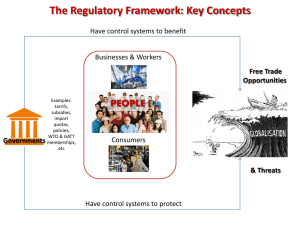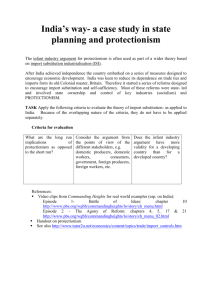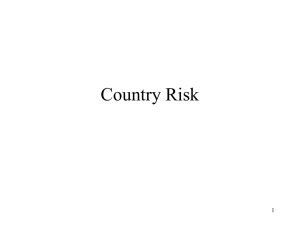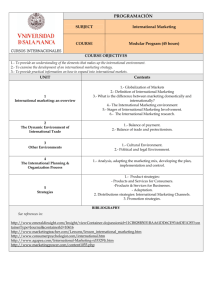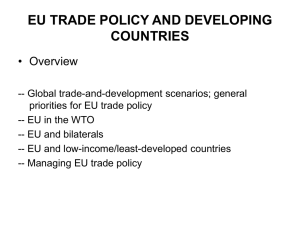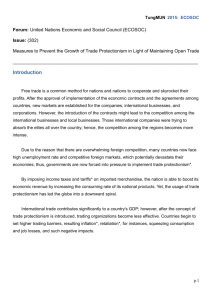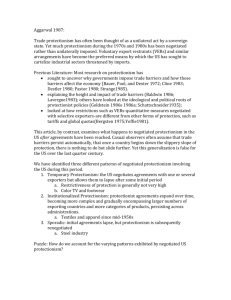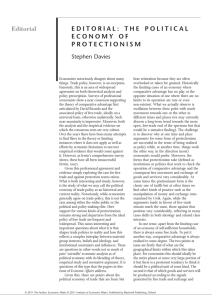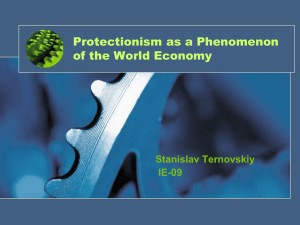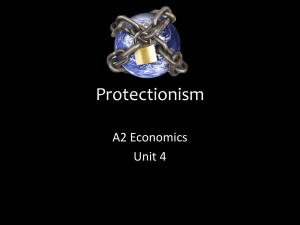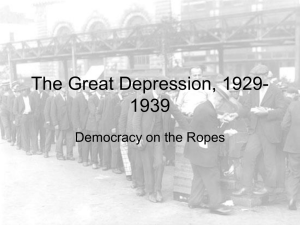supporting statement
advertisement
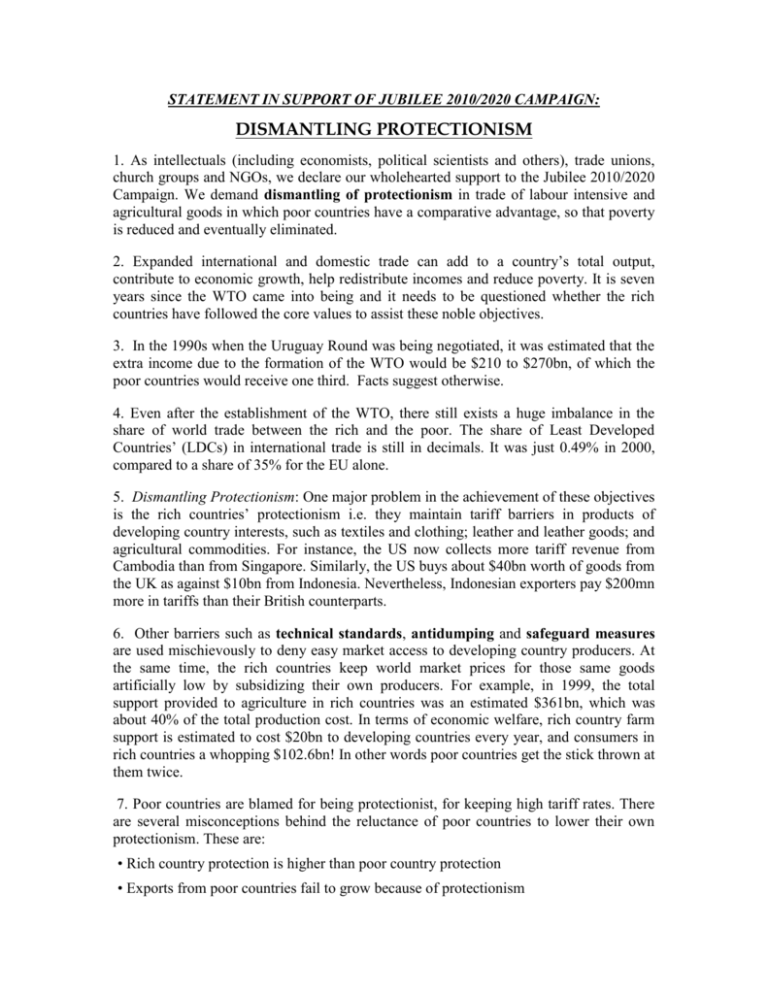
STATEMENT IN SUPPORT OF JUBILEE 2010/2020 CAMPAIGN: DISMANTLING PROTECTIONISM 1. As intellectuals (including economists, political scientists and others), trade unions, church groups and NGOs, we declare our wholehearted support to the Jubilee 2010/2020 Campaign. We demand dismantling of protectionism in trade of labour intensive and agricultural goods in which poor countries have a comparative advantage, so that poverty is reduced and eventually eliminated. 2. Expanded international and domestic trade can add to a country’s total output, contribute to economic growth, help redistribute incomes and reduce poverty. It is seven years since the WTO came into being and it needs to be questioned whether the rich countries have followed the core values to assist these noble objectives. 3. In the 1990s when the Uruguay Round was being negotiated, it was estimated that the extra income due to the formation of the WTO would be $210 to $270bn, of which the poor countries would receive one third. Facts suggest otherwise. 4. Even after the establishment of the WTO, there still exists a huge imbalance in the share of world trade between the rich and the poor. The share of Least Developed Countries’ (LDCs) in international trade is still in decimals. It was just 0.49% in 2000, compared to a share of 35% for the EU alone. 5. Dismantling Protectionism: One major problem in the achievement of these objectives is the rich countries’ protectionism i.e. they maintain tariff barriers in products of developing country interests, such as textiles and clothing; leather and leather goods; and agricultural commodities. For instance, the US now collects more tariff revenue from Cambodia than from Singapore. Similarly, the US buys about $40bn worth of goods from the UK as against $10bn from Indonesia. Nevertheless, Indonesian exporters pay $200mn more in tariffs than their British counterparts. 6. Other barriers such as technical standards, antidumping and safeguard measures are used mischievously to deny easy market access to developing country producers. At the same time, the rich countries keep world market prices for those same goods artificially low by subsidizing their own producers. For example, in 1999, the total support provided to agriculture in rich countries was an estimated $361bn, which was about 40% of the total production cost. In terms of economic welfare, rich country farm support is estimated to cost $20bn to developing countries every year, and consumers in rich countries a whopping $102.6bn! In other words poor countries get the stick thrown at them twice. 7. Poor countries are blamed for being protectionist, for keeping high tariff rates. There are several misconceptions behind the reluctance of poor countries to lower their own protectionism. These are: • Rich country protection is higher than poor country protection • Exports from poor countries fail to grow because of protectionism • Trade barriers against poor countries reflect hypocrisy on the part of rich countries • Poor countries do not want to lift their trade barriers when there are still trade barriers in rich countries Truly, these misconceptions need to be addressed, as the lack of action is not only hurting the rich countries. Rich country protectionism against the labour intensive products of the poor countries is an equally important issue. It is undeniably hurting poor countries. 8. It is time for action: Every time efforts have been made to assist the poor countries, resolves have disappeared into thin air. Except when the European Union launched the Everything but Arms (EBA) initiative for zero duties on exports from least developed countries (LDCs). However, some people have described EBA as Everything But Farms because agriculture goods will continue to attract the same rate of high duties. 9. The recently launched Doha Development Agenda in November 2001 has an explicit mandate to address tariff barriers in the rich countries. It has put forward an agenda with a keyword ‘development’. This calls for more liberal trade. It must be understood that the opening up of global trade is not a substitute for economic development. It is a tool. It is essential to deal with hurdles that confront the system. The common misconceptions that are blocking the removal of protectionism by poor countries must be addressed. At the same time, rich countries must dismantle protectionism against labour-intensive goods of the poor countries. 10. If rich countries eliminate protection from labour-intensive goods, indeed their own unskilled poor will suffer. This will put the issue into both ethical and political difficulties. Hence, the answer must be a gradual but certain, phase-out of the protection coupled with adjustment programmes for affected workers. 11. To make progress on trade liberalisation world wide, the rich must stop massive direct and indirect subsidies and protection to their producers. Nevertheless, even when all protectionism on both sides has gone, the poor countries also need to address the important issue of their own capacity to exploit opportunities. 12. We suggest: Inspired by the success of the Jubilee 2000 movement, which brought debt relief to poor countries, the Jubilee 2010/2020 Campaign aims to tear down all trade barriers. The Campaign will ask the rich to demolish all trade barriers on poor country exports in two phases. The first phase, which is to end in 2010, will ask for total elimination of trade barriers on everything, but agriculture. Realising that agriculture is a more sensitive issue in the rich countries, they must eliminate all barriers by 2020.These reforms should not and must not be replaced by new barriers such as anti-dumping and safeguard measures. This is necessary to liberalise genuinely and take forward the development agenda. This aims at the eradication of poverty through economic growth and proper distribution of income. 13. Eradication of poverty is a shared and moral responsibility of the international community. In spite of rapid economic growth in many parts of the world, the absolute number of poor people (living on less than a dollar a day) was still steady at around 1.2 billion in 1998. On $2 per day, it would mean 2.8 billion people, or almost half of the world’s population! 14. Renewed action is required to arrest this deprivation and destitution. We need a universal application of Article 25 of the UN Declaration of Human Rights, which states: “Everyone has the right to a standard of living adequate for the health and well-being of himself and his family, including food, clothing, housing and medical care and necessary social services”. This has led to the adoption of the Millennium Development Goals, which seek to eradicate extreme poverty and hunger in the world. The international community has pledged to reduce poverty by half by 2015. 15. Poor countries have already accepted the significance of the WTO to enable their future growth and development. Now, the onus lies on the developed countries to make them partners in development through trade. This would help them to integrate into the global economy on fair terms. It is not only the poor countries that would gain out of better terms of trade, but the rich are expected to gain as well. Not only people, but also the environment would gain hugely, when people have resources to protect them. It’s a win-win-win situation for all! We the following have put our names in support of the campaign Mr. Jagdish Bhagwati ,University of Columbia, U.S.A Mr. Arvind Pangariya ,Universuty of Maryland, U.S.A Mr. Pradeep S Mehta , CUTS, India Mr. Abid Qaiyum Suleri, SDPI, Pakistan Ms. Suparna Karmakar, Assocham, New Delhi Mr. Adedeji Babatunde Abiodun , CITEED , Nigeria
